CIMA Code of Ethics: Principles and Threats in Professional Accounting
VerifiedAdded on 2020/06/05
|6
|1245
|110
Report
AI Summary
This report provides an overview of the main ethical principles of the Chartered Institute of Management Accountants (CIMA) and the ethical threats faced by professional accountants. The report begins by outlining the five fundamental principles of the CIMA code of ethics: integrity, objectivity, professional competence, confidentiality, and professional behavior. Each principle is explained with examples of how it applies in a professional context. The report then moves on to discuss the ethical threats that accountants may encounter, including pressure from management, the role of the accountant as a whistle-blower, and the omission of financial records. The report includes references to academic sources to support its analysis. The report concludes by emphasizing the importance of adhering to ethical standards in the accounting profession to maintain trust and integrity.
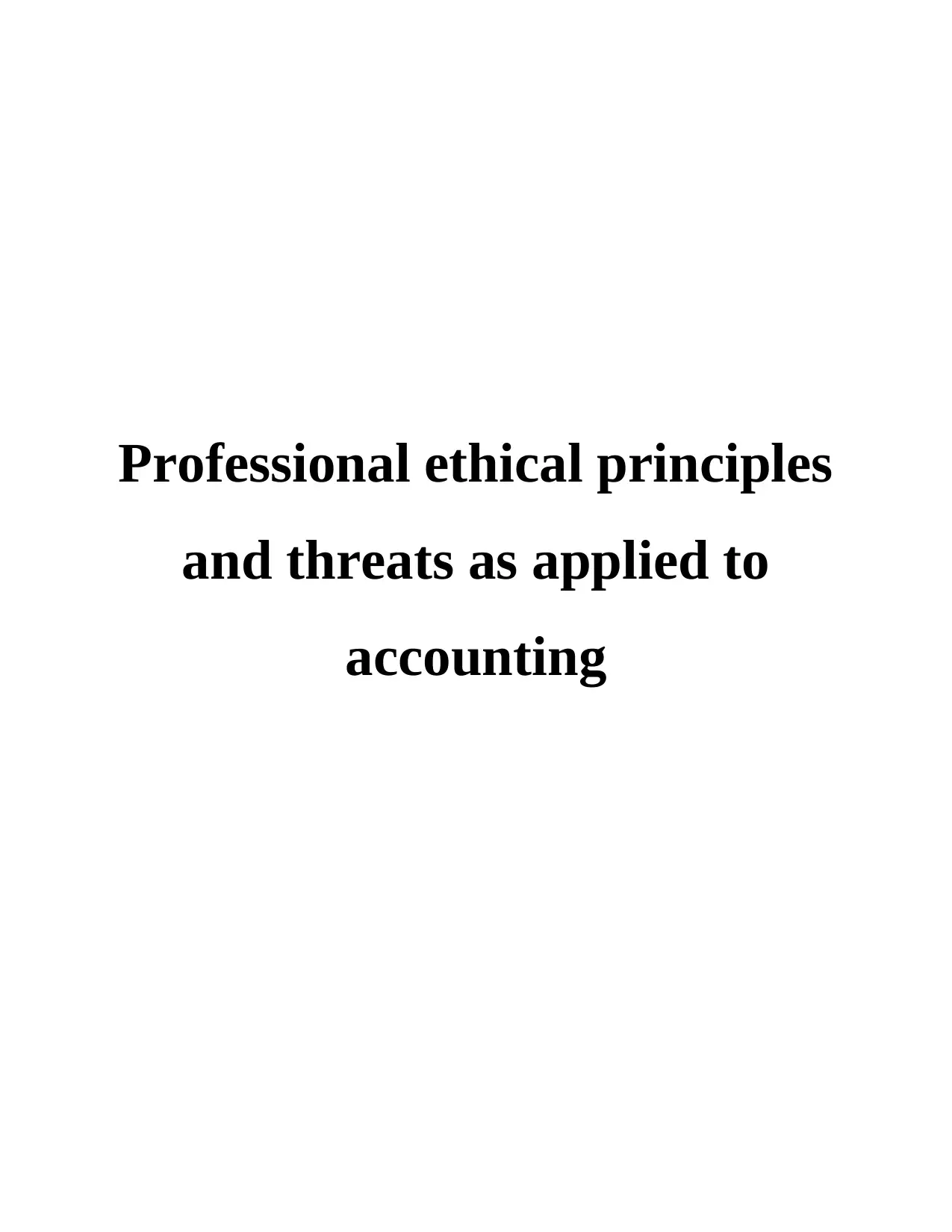
Professional ethical principles
and threats as applied to
accounting
and threats as applied to
accounting
Paraphrase This Document
Need a fresh take? Get an instant paraphrase of this document with our AI Paraphraser
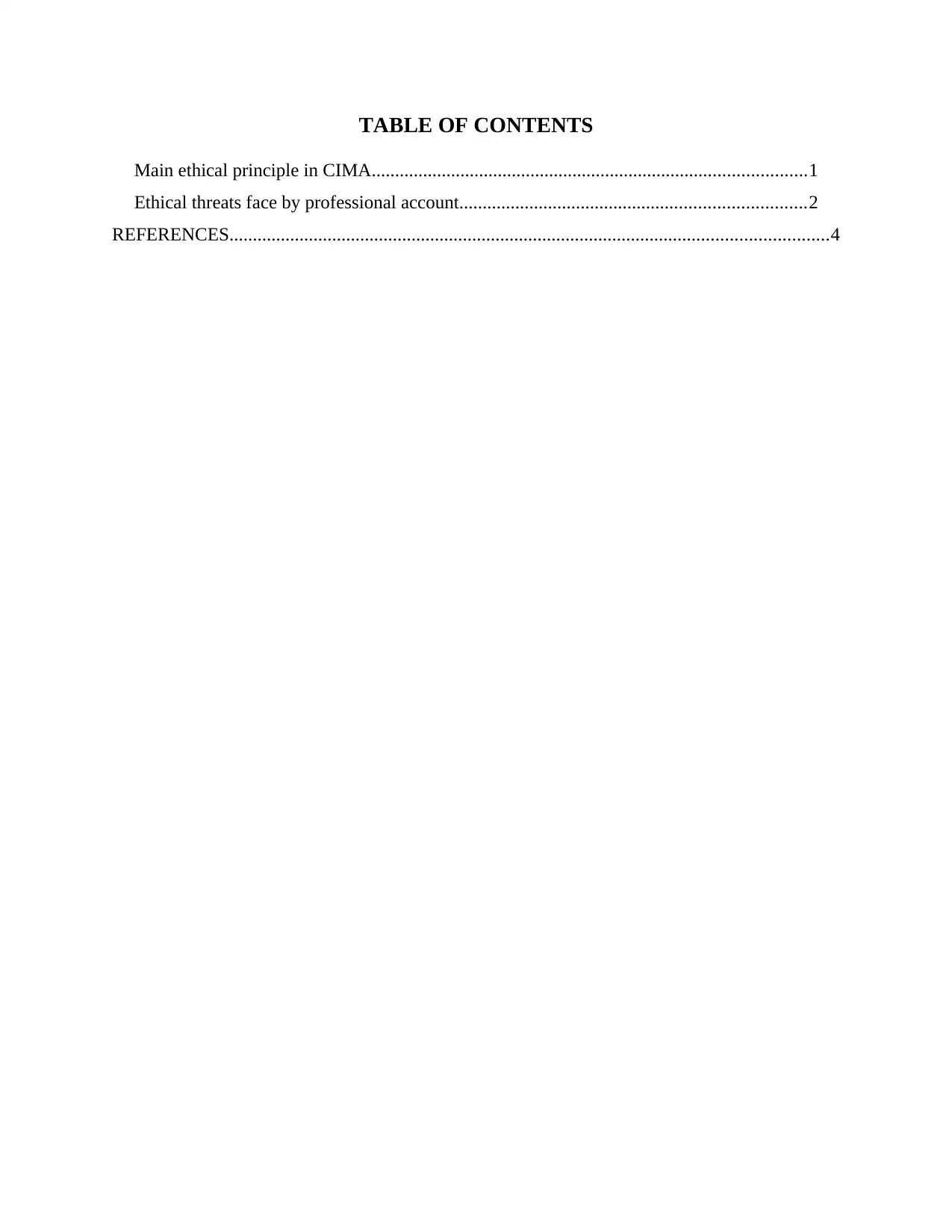
TABLE OF CONTENTS
Main ethical principle in CIMA.............................................................................................1
Ethical threats face by professional account..........................................................................2
REFERENCES................................................................................................................................4
Main ethical principle in CIMA.............................................................................................1
Ethical threats face by professional account..........................................................................2
REFERENCES................................................................................................................................4
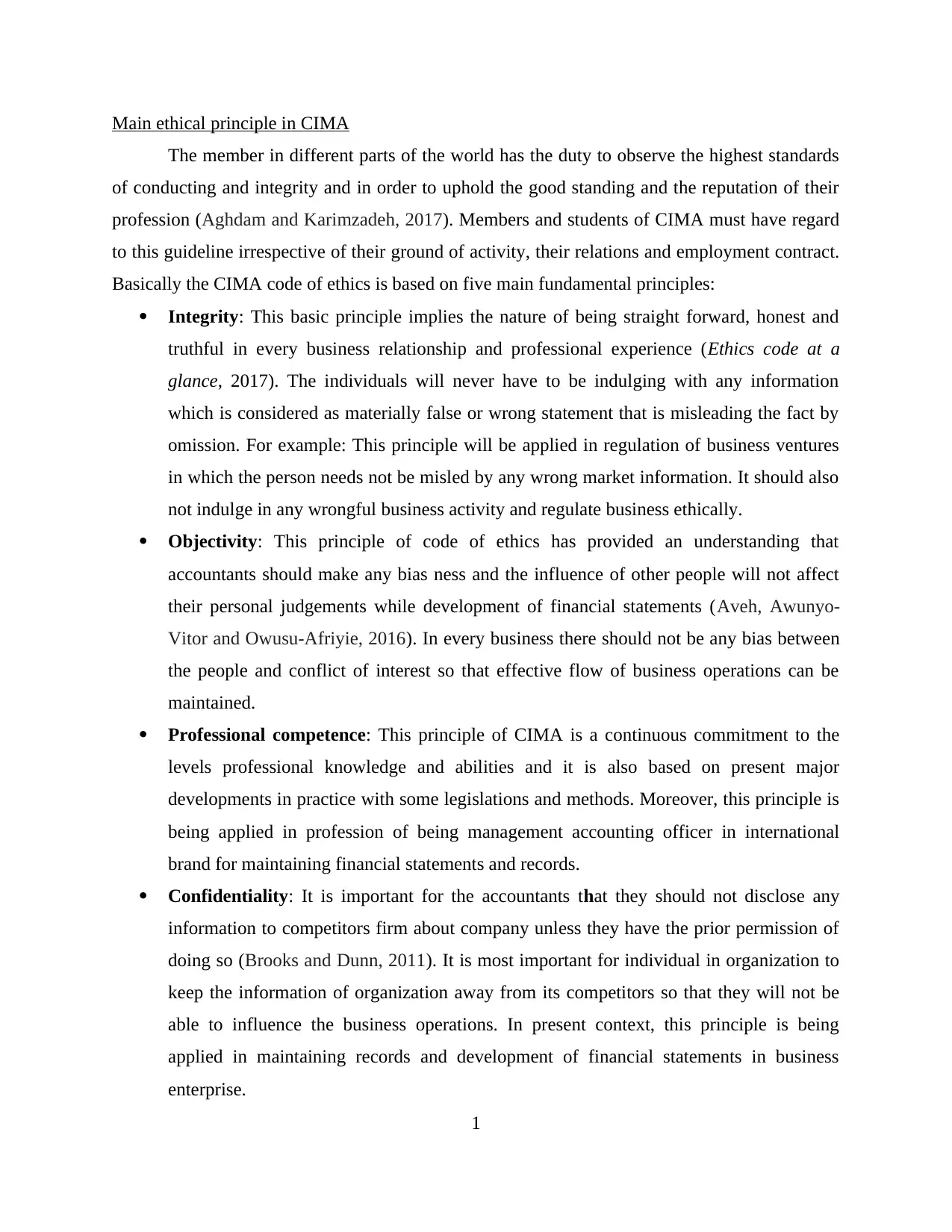
Main ethical principle in CIMA
The member in different parts of the world has the duty to observe the highest standards
of conducting and integrity and in order to uphold the good standing and the reputation of their
profession (Aghdam and Karimzadeh, 2017). Members and students of CIMA must have regard
to this guideline irrespective of their ground of activity, their relations and employment contract.
Basically the CIMA code of ethics is based on five main fundamental principles:
Integrity: This basic principle implies the nature of being straight forward, honest and
truthful in every business relationship and professional experience (Ethics code at a
glance, 2017). The individuals will never have to be indulging with any information
which is considered as materially false or wrong statement that is misleading the fact by
omission. For example: This principle will be applied in regulation of business ventures
in which the person needs not be misled by any wrong market information. It should also
not indulge in any wrongful business activity and regulate business ethically.
Objectivity: This principle of code of ethics has provided an understanding that
accountants should make any bias ness and the influence of other people will not affect
their personal judgements while development of financial statements (Aveh, Awunyo-
Vitor and Owusu-Afriyie, 2016). In every business there should not be any bias between
the people and conflict of interest so that effective flow of business operations can be
maintained.
Professional competence: This principle of CIMA is a continuous commitment to the
levels professional knowledge and abilities and it is also based on present major
developments in practice with some legislations and methods. Moreover, this principle is
being applied in profession of being management accounting officer in international
brand for maintaining financial statements and records.
Confidentiality: It is important for the accountants that they should not disclose any
information to competitors firm about company unless they have the prior permission of
doing so (Brooks and Dunn, 2011). It is most important for individual in organization to
keep the information of organization away from its competitors so that they will not be
able to influence the business operations. In present context, this principle is being
applied in maintaining records and development of financial statements in business
enterprise.
1
The member in different parts of the world has the duty to observe the highest standards
of conducting and integrity and in order to uphold the good standing and the reputation of their
profession (Aghdam and Karimzadeh, 2017). Members and students of CIMA must have regard
to this guideline irrespective of their ground of activity, their relations and employment contract.
Basically the CIMA code of ethics is based on five main fundamental principles:
Integrity: This basic principle implies the nature of being straight forward, honest and
truthful in every business relationship and professional experience (Ethics code at a
glance, 2017). The individuals will never have to be indulging with any information
which is considered as materially false or wrong statement that is misleading the fact by
omission. For example: This principle will be applied in regulation of business ventures
in which the person needs not be misled by any wrong market information. It should also
not indulge in any wrongful business activity and regulate business ethically.
Objectivity: This principle of code of ethics has provided an understanding that
accountants should make any bias ness and the influence of other people will not affect
their personal judgements while development of financial statements (Aveh, Awunyo-
Vitor and Owusu-Afriyie, 2016). In every business there should not be any bias between
the people and conflict of interest so that effective flow of business operations can be
maintained.
Professional competence: This principle of CIMA is a continuous commitment to the
levels professional knowledge and abilities and it is also based on present major
developments in practice with some legislations and methods. Moreover, this principle is
being applied in profession of being management accounting officer in international
brand for maintaining financial statements and records.
Confidentiality: It is important for the accountants that they should not disclose any
information to competitors firm about company unless they have the prior permission of
doing so (Brooks and Dunn, 2011). It is most important for individual in organization to
keep the information of organization away from its competitors so that they will not be
able to influence the business operations. In present context, this principle is being
applied in maintaining records and development of financial statements in business
enterprise.
1
⊘ This is a preview!⊘
Do you want full access?
Subscribe today to unlock all pages.

Trusted by 1+ million students worldwide
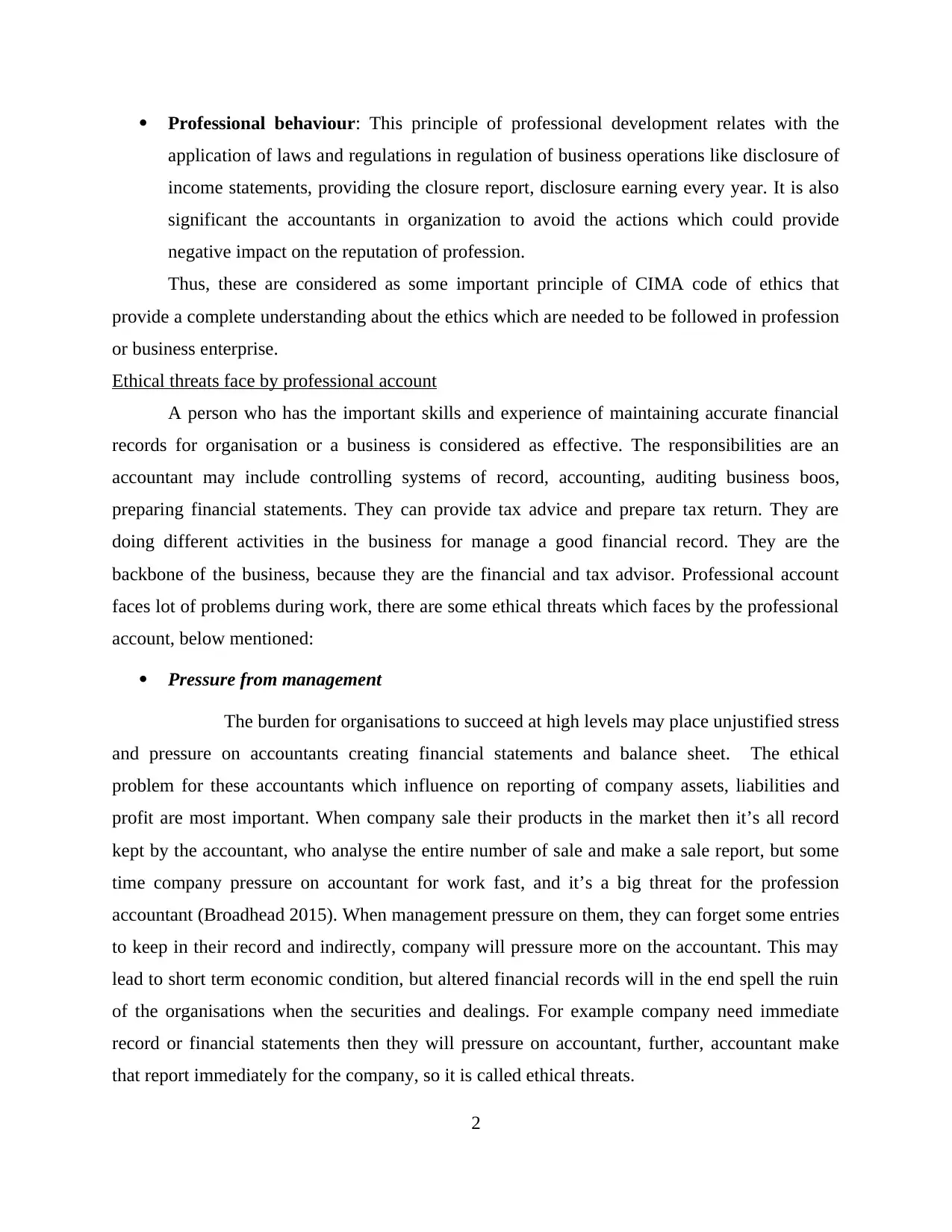
Professional behaviour: This principle of professional development relates with the
application of laws and regulations in regulation of business operations like disclosure of
income statements, providing the closure report, disclosure earning every year. It is also
significant the accountants in organization to avoid the actions which could provide
negative impact on the reputation of profession.
Thus, these are considered as some important principle of CIMA code of ethics that
provide a complete understanding about the ethics which are needed to be followed in profession
or business enterprise.
Ethical threats face by professional account
A person who has the important skills and experience of maintaining accurate financial
records for organisation or a business is considered as effective. The responsibilities are an
accountant may include controlling systems of record, accounting, auditing business boos,
preparing financial statements. They can provide tax advice and prepare tax return. They are
doing different activities in the business for manage a good financial record. They are the
backbone of the business, because they are the financial and tax advisor. Professional account
faces lot of problems during work, there are some ethical threats which faces by the professional
account, below mentioned:
Pressure from management
The burden for organisations to succeed at high levels may place unjustified stress
and pressure on accountants creating financial statements and balance sheet. The ethical
problem for these accountants which influence on reporting of company assets, liabilities and
profit are most important. When company sale their products in the market then it’s all record
kept by the accountant, who analyse the entire number of sale and make a sale report, but some
time company pressure on accountant for work fast, and it’s a big threat for the profession
accountant (Broadhead 2015). When management pressure on them, they can forget some entries
to keep in their record and indirectly, company will pressure more on the accountant. This may
lead to short term economic condition, but altered financial records will in the end spell the ruin
of the organisations when the securities and dealings. For example company need immediate
record or financial statements then they will pressure on accountant, further, accountant make
that report immediately for the company, so it is called ethical threats.
2
application of laws and regulations in regulation of business operations like disclosure of
income statements, providing the closure report, disclosure earning every year. It is also
significant the accountants in organization to avoid the actions which could provide
negative impact on the reputation of profession.
Thus, these are considered as some important principle of CIMA code of ethics that
provide a complete understanding about the ethics which are needed to be followed in profession
or business enterprise.
Ethical threats face by professional account
A person who has the important skills and experience of maintaining accurate financial
records for organisation or a business is considered as effective. The responsibilities are an
accountant may include controlling systems of record, accounting, auditing business boos,
preparing financial statements. They can provide tax advice and prepare tax return. They are
doing different activities in the business for manage a good financial record. They are the
backbone of the business, because they are the financial and tax advisor. Professional account
faces lot of problems during work, there are some ethical threats which faces by the professional
account, below mentioned:
Pressure from management
The burden for organisations to succeed at high levels may place unjustified stress
and pressure on accountants creating financial statements and balance sheet. The ethical
problem for these accountants which influence on reporting of company assets, liabilities and
profit are most important. When company sale their products in the market then it’s all record
kept by the accountant, who analyse the entire number of sale and make a sale report, but some
time company pressure on accountant for work fast, and it’s a big threat for the profession
accountant (Broadhead 2015). When management pressure on them, they can forget some entries
to keep in their record and indirectly, company will pressure more on the accountant. This may
lead to short term economic condition, but altered financial records will in the end spell the ruin
of the organisations when the securities and dealings. For example company need immediate
record or financial statements then they will pressure on accountant, further, accountant make
that report immediately for the company, so it is called ethical threats.
2
Paraphrase This Document
Need a fresh take? Get an instant paraphrase of this document with our AI Paraphraser
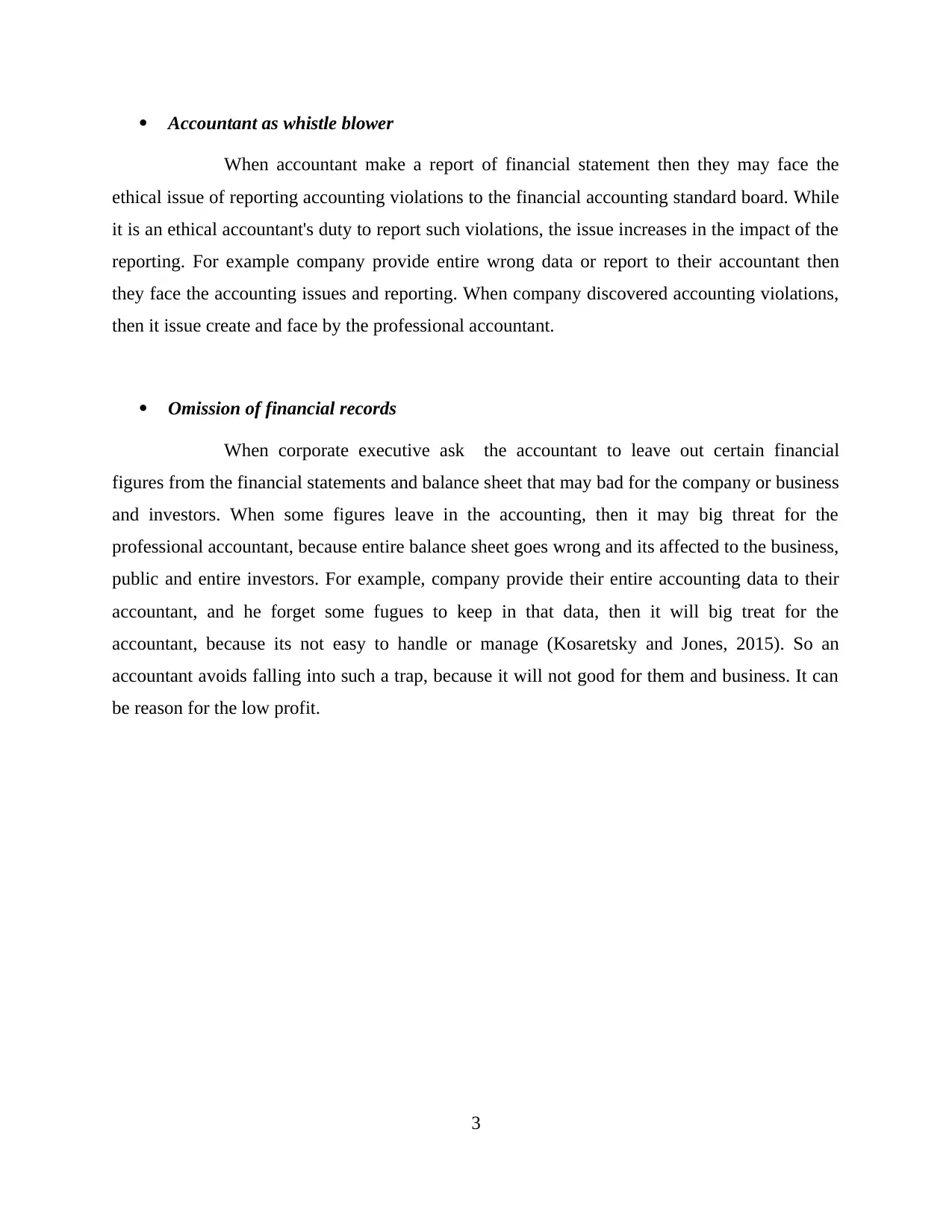
Accountant as whistle blower
When accountant make a report of financial statement then they may face the
ethical issue of reporting accounting violations to the financial accounting standard board. While
it is an ethical accountant's duty to report such violations, the issue increases in the impact of the
reporting. For example company provide entire wrong data or report to their accountant then
they face the accounting issues and reporting. When company discovered accounting violations,
then it issue create and face by the professional accountant.
Omission of financial records
When corporate executive ask the accountant to leave out certain financial
figures from the financial statements and balance sheet that may bad for the company or business
and investors. When some figures leave in the accounting, then it may big threat for the
professional accountant, because entire balance sheet goes wrong and its affected to the business,
public and entire investors. For example, company provide their entire accounting data to their
accountant, and he forget some fugues to keep in that data, then it will big treat for the
accountant, because its not easy to handle or manage (Kosaretsky and Jones, 2015). So an
accountant avoids falling into such a trap, because it will not good for them and business. It can
be reason for the low profit.
3
When accountant make a report of financial statement then they may face the
ethical issue of reporting accounting violations to the financial accounting standard board. While
it is an ethical accountant's duty to report such violations, the issue increases in the impact of the
reporting. For example company provide entire wrong data or report to their accountant then
they face the accounting issues and reporting. When company discovered accounting violations,
then it issue create and face by the professional accountant.
Omission of financial records
When corporate executive ask the accountant to leave out certain financial
figures from the financial statements and balance sheet that may bad for the company or business
and investors. When some figures leave in the accounting, then it may big threat for the
professional accountant, because entire balance sheet goes wrong and its affected to the business,
public and entire investors. For example, company provide their entire accounting data to their
accountant, and he forget some fugues to keep in that data, then it will big treat for the
accountant, because its not easy to handle or manage (Kosaretsky and Jones, 2015). So an
accountant avoids falling into such a trap, because it will not good for them and business. It can
be reason for the low profit.
3
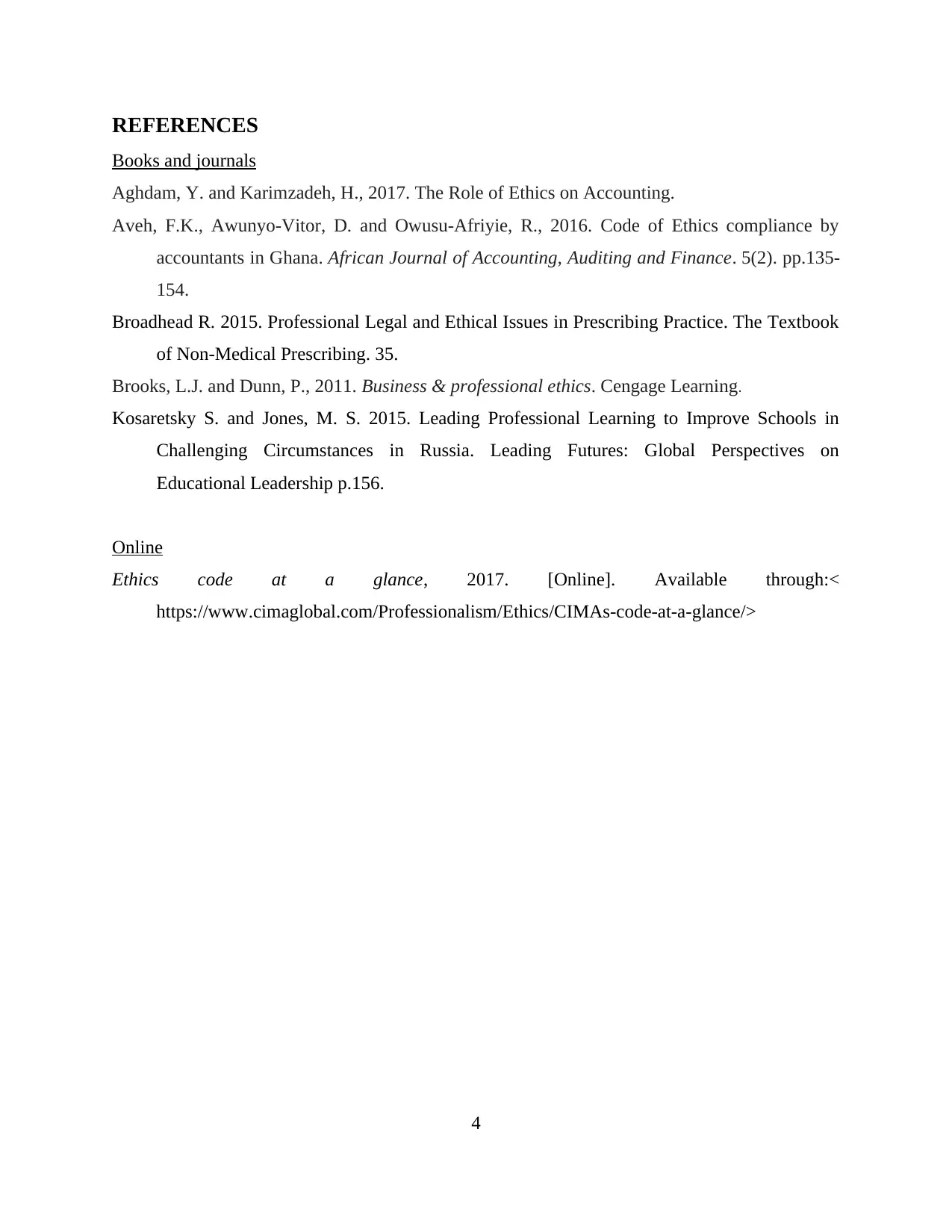
REFERENCES
Books and journals
Aghdam, Y. and Karimzadeh, H., 2017. The Role of Ethics on Accounting.
Aveh, F.K., Awunyo-Vitor, D. and Owusu-Afriyie, R., 2016. Code of Ethics compliance by
accountants in Ghana. African Journal of Accounting, Auditing and Finance. 5(2). pp.135-
154.
Broadhead R. 2015. Professional Legal and Ethical Issues in Prescribing Practice. The Textbook
of Non-Medical Prescribing. 35.
Brooks, L.J. and Dunn, P., 2011. Business & professional ethics. Cengage Learning.
Kosaretsky S. and Jones, M. S. 2015. Leading Professional Learning to Improve Schools in
Challenging Circumstances in Russia. Leading Futures: Global Perspectives on
Educational Leadership p.156.
Online
Ethics code at a glance, 2017. [Online]. Available through:<
https://www.cimaglobal.com/Professionalism/Ethics/CIMAs-code-at-a-glance/>
4
Books and journals
Aghdam, Y. and Karimzadeh, H., 2017. The Role of Ethics on Accounting.
Aveh, F.K., Awunyo-Vitor, D. and Owusu-Afriyie, R., 2016. Code of Ethics compliance by
accountants in Ghana. African Journal of Accounting, Auditing and Finance. 5(2). pp.135-
154.
Broadhead R. 2015. Professional Legal and Ethical Issues in Prescribing Practice. The Textbook
of Non-Medical Prescribing. 35.
Brooks, L.J. and Dunn, P., 2011. Business & professional ethics. Cengage Learning.
Kosaretsky S. and Jones, M. S. 2015. Leading Professional Learning to Improve Schools in
Challenging Circumstances in Russia. Leading Futures: Global Perspectives on
Educational Leadership p.156.
Online
Ethics code at a glance, 2017. [Online]. Available through:<
https://www.cimaglobal.com/Professionalism/Ethics/CIMAs-code-at-a-glance/>
4
⊘ This is a preview!⊘
Do you want full access?
Subscribe today to unlock all pages.

Trusted by 1+ million students worldwide
1 out of 6
Related Documents
Your All-in-One AI-Powered Toolkit for Academic Success.
+13062052269
info@desklib.com
Available 24*7 on WhatsApp / Email
![[object Object]](/_next/static/media/star-bottom.7253800d.svg)
Unlock your academic potential
Copyright © 2020–2025 A2Z Services. All Rights Reserved. Developed and managed by ZUCOL.





